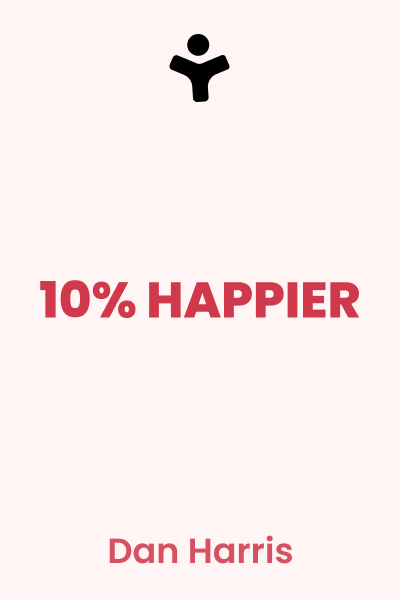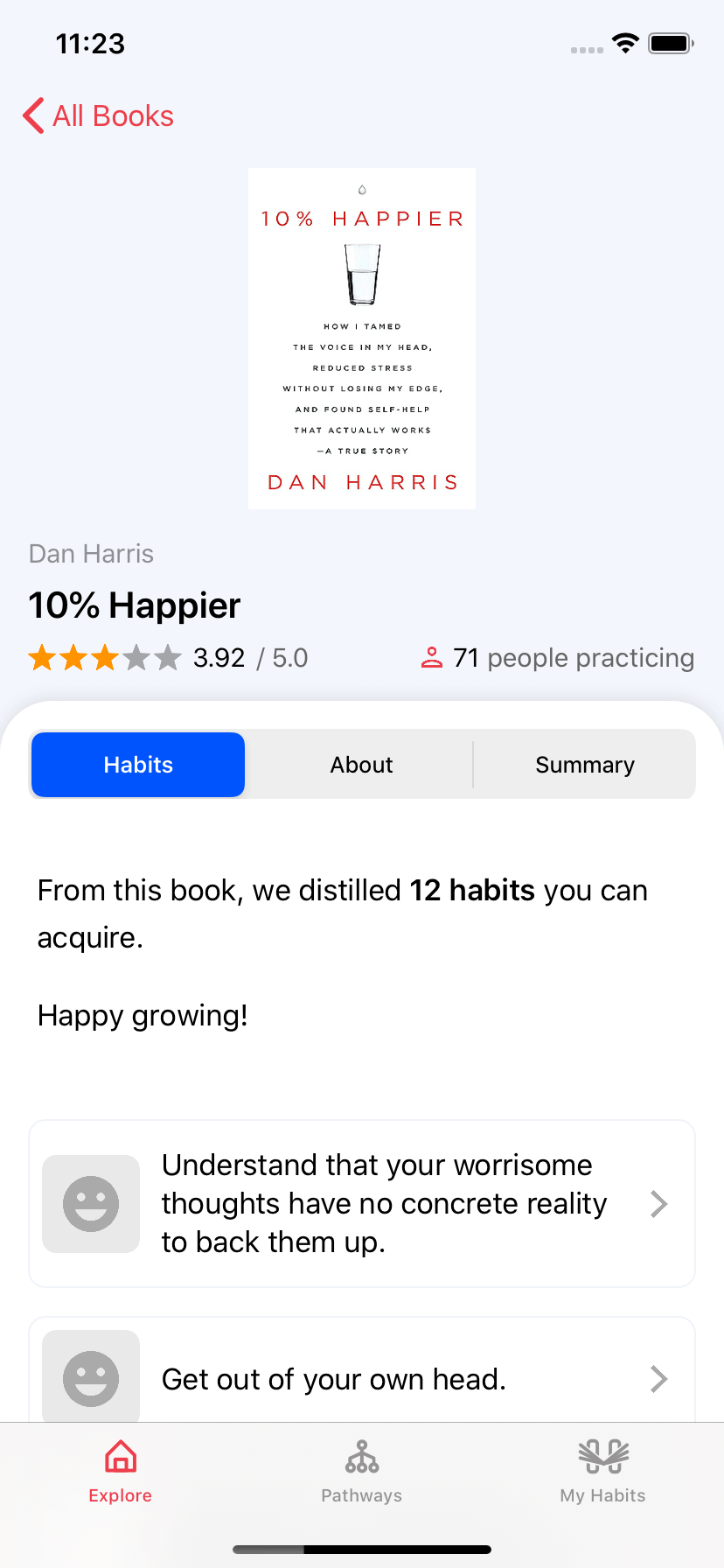
10% Happier: How I Tamed the Voice in My Head, Reduced Stress Without Losing My Edge, and Found Self-Help That Actually Works
by Dan HarrisYour mind can be your best friend, but it can also be your biggest enemy. It is not easy to tame the negative voice inside your head that keeps you from being truly happy, but it is possible. 10% Happier is the true story of a man who discovered how to cross the barriers keeping him from achieving happiness. It also promises to help you become 10 percent happier—this may not seem like a lot, but it is.
We have analyzed the book and compiled a list of actionable items from it that will help you become 10 percent happier, as well as increase your level of success and productivity. Most of these actions revolve around the theme of “mindfulness,” which is a simple concept that describes the quality of being aware of both yourself and your surroundings in the present moment. By implementing even one or two of the actions below into your daily routine, you will notice a marked increase in your happiness.
Genius or Lunatic?
“Make the present moment your friend rather than your enemy.”
When you don't allow yourself to feel your emotions fully, they manifest in your body. For example, you may feel like you're constantly coming down with the flu or just plain exhausted after performing simple tasks. It often feels like a physical ailment, but the root cause is emotional.
It's entirely possible to be depressed without being conscious of it. The human brain is rational, it will always be able to provide a reason for what you're feeling. However, you'll notice that the truth still expresses itself. For example, you may self-medicate through an addiction.
The rational human brain runs on what we feed it. When we spend a lot of time ruminating on our problems, we're hardwiring our brain to focus on the struggle and only that. On the other hand, spending even an hour a week reflecting on how we fit into the bigger picture, or our larger purpose in life, can help us gain perspective. Basically, if you're never looking up, you're always just looking around.
All of us have a little voice in our head that talks constantly. It judges and labels everything in it sees - both in other people and in ourselves. We're so used to hearing this voice all the time, so we think that it is us. However, this voice is simply our ego. It's what tells you to choose drama, to hold onto grudges, or to make impulsive and rash decisions. It's overly critical and never satisfied. Most importantly, it's obsessed with the past and the future, at the expense of the present.
When we identify ourselves with our ego, we live as if the present moment were an obstacle to overcome in order to reach the future. This moment is never right, we're always trying to get to the next one. There's no benefit to living like this, only continuous stress.
Actions to take
The Power of Negative Thinking
“Picture the mind like a waterfall: the water is the torrent of thoughts and emotions; mindfulness is the space behind the waterfall.”
Nothing lasts, not even us. We only suffer because we cling to these things that don't last. We may know this intellectually, but we are hardwired for denial on an emotional level. To break through this denial, we have to achieve a visceral understanding of the impermenance of everything. We have to accept that life is innately insecure and let go of what we are attached to.
Practising mindfulness allows you to let go and live in the present moment. It is the ability to recognize what is happening in your mind right now - anger, jealousy, sadness, pain, etc - without judgment. Once you master mindfulness, you will be able to sap the negative emotional charge out of your thoughts.
Meditation is one way to practice mindfulness. It's a mental exercise that pushes you to regain control of your mind. To take back the reins of control and observe your thoughts without getting emotionally sucked in.
It won't be easy, at first. It's common to feel resistance to meditation, and you may even experience physical feelings such as itchiness or sleepiness when you begin. Power through it and you'll start seeing the benefits: a calmer, clearer mind that allows you to relax into the present.
When a big wave is coming at you, the best thing to do is dive in. It's impossible to avoid stressful situations in life, but we can still maintain inner peace regardless.
Actions to take
Retreat
“Even if we were handed everything we wanted, would it really make us sustainably happy?”
Most of us are just looking for the next pleasant hit of anything - the next meal, the next relationship, the next vacation, etc. We stress ourselves out over what we want but do not have yet.
It's not wrong to enjoy life and work towards success. However, getting carried away by desires only brings you further away from what you really want. Imagine you're a fish in the ocean and all the sights, sounds and smells of the world are bait. When you bite the hook and give into desire, you also give up the opportunity to be free.
Daily life requires you to do something and expect a result. Does this make us happy? Or does it just get stuff done? When we simply sit with ourselves instead, and experience each thought in a state of choiceless awareness, we can access our inner peace. This doesn't mean we reach a state where we have no thoughts. Rather, we can experience each thought or sensation fully, yet unemotionally. We can focus with ease and clarity until it is replaced by something else.
Pleasure is fleeting. We often tell ourselves if only we had something, did something or were something more, we'd have what we wanted. For example, as soon as we get that promotion or that relationship, if we go to that party or on vacation, if we have that meal or buy that car, etc, we will be happy. However, this pursuit of happiness is what causes unhappiness.
Calm the worrisome brain that is always saying you need something more. Cultivate a mind that allows you to feel peaceful and relaxed at all times.
Actions to take
The New Caffeine
“It’s neuroscience that would say that our capacity to multitask is virtually nonexistent.”
We are often led to believe that wellbeing, resilience and impulse control are things we're born with. However, the brain can be trained, and meditation is a great way to do it. It promotes growth in the regions associated with self-awareness and compassion, and reduces in regions associated with stress. This helps you regulate your primal urges more.
It's not just about inner peace and happiness. Meditation helps in all aspects of life, including work. It can help you grow more confident, boost your focus and nurture your creativity. Even if stress motivates you, meditation will help you get the most out of it. It helps you develop the mindset most attuned to your life and needs.
The best way to solve a problem is to work hard on it, and if a solution can’t be found, to just let it go for a while. Do something that relaxes and distracts you (not necessarily meditation), and your unconscious mind will help you find the solution.
Actions to take
The Self Interested Case For Not Being A Dick
“That notion of being nice for selfish reasons"
It feels like we need to be a little self-centred in order to succeed. However, most of the worries, troubles, and sadness we face actually comes from this self-centredness.
This means that practising compassion and thinking less about just yourself is actually in your self-interest to do. It erodes the edges of your ego - that critical inner voice that never stops talking - and gives you a reason to feel good about yourself (also known as "the warm glow" effect in neuroscience). It helps you form closer connections with people around you and makes it easier to win them over in tense situations.
Overall, compassionate people tend to be healthier, happier, more popular and more successful at work.
Actions to take
Hide The Zen
“What I should have done when faced with this adversity was buckle down and work harder.”
How do you strike a balance between the price of security and the wisdom of insecurity?
There are three traps people often fall into when they acknowledge insecurity and begin the journey towards true happiness:
- Meekness
- Detachment
- Nihilism (everything's impermanent anyway)
Being too meek can cause others not to take you seriously. Being too detached can cause you to miss out on opportunities. Embracing nihilism can cause you to give up. Balance is needed. It's therefore better to strive for success, but acknowledge that the final results are out of your control.
Don't waste your energy on variables you can't control. Instead, focus on what you can control. Decide what you truly want, and eliminate unnecessary activities that do not lead you where you want to go. Be wisely ambitious - do everything in your power to succeed but don't be attached to the outcome. Even if you fail, you'll be able to get back up much more easily.
Remember, focus your energy on self-improvement, rather than self-criticism. Your resilience will increase tremendously, and you will be much more likely to stay on track toward achieving what you want.
Actions to take
Don’t just read. Act.



